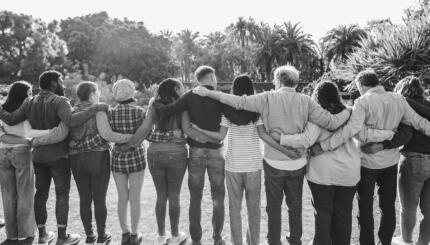Growing up at the Jersey Shore in the 1990s, my brother and I spent a significant amount of our free time at arcades. One of our favorite games was Street Fighter. Before each game, we would choose from a range of fighters, each with a different set of skills and abilities. We would spend a fair amount of time on this, considering which fighters had the right combination of traits to beat the bad guys and let us win. Of course, the characters we chose didn’t just reflect serious consideration of their particular strengths, but also revealed much about who we were, our values, and how we evaluated strength and greatness.
Choosing a street fighter isn’t all that dissimilar from designing your ultimate deity. The way in which we imagine God illustrates our core values and ways of making sense of the universe, and reflects our collective views of strength, skill, and worth.
We see this dynamic at play in the morning prayer Yotzer Or. This prayer comes after the Barekhu, the Jewish call to prayer, in the lead-up to the recitation of the Shema during morning prayers. Just like the Shema, Yotzer Or affirms the unity of God’s existence and details the theological implications of monotheism.
The text of the prayer reads:
With your help, My Jewish Learning can provide endless opportunities for learning, connection and discovery.
בָּרוּךְ אַתָּה ה’, אֱלהֵינוּ מֶלֶךְ הָעולָם, יוצֵר אור וּבורֵא חשֶׁךְ. עֹשֶׂה שָׁלום וּבורֵא אֶת הַכּל
Blessed are You, Lord our God, king of the universe, who forms light and creates darkness, makes peace and creates everything.
Yotzer Or is not only a statement of faith, but also reflects how two different societies chose two different conceptions of God. The prayer is an adaptation of Isaiah 45:7, whose author was active during the Babylonian exile and was steeped in a culture of Persian dualism, which posited that there were two opposing spiritual forces in the world, not just one. The Bible scholar Marc Brettler explains that Yotzer Or is a polemic that emphasizes Jewish monotheism and the contention that a single God must be responsible for both good and evil.
In fact, though our prayer ends with the words “makes peace and creates everything,” the original verse from Isaiah is even more pointed, claiming that God “makes peace and creates evil.” Our liturgists did not want our morning prayers to explicitly remind us that God is responsible for evil, but they still wanted us to remember something core about a Jewish conception of divinity: God is responsible for everything. Our faith does not allow us to attribute evil to a bad second god or a menacing Satan. If God is all powerful, God is responsible for everything. Which of course begs the question, Who would choose such a God?
The most straightforward answer is: monotheists. Belief in one God requires us to attribute everything in the world to a solitary creator. It’s also necessary to cultivate faithful people. In order to stay in relationship — whether with God or with one another — one must relinquish the idea of monochromatic beings. Mature and resilient relationships can accommodate the good and the bad, the light and the darkness, the pleasure and the trouble. Our foundational relationships are not with Platonic ideals, pure and unadulterated in their essences. Rather, they are textured, complex, and challenging. In a word, they are real.
While the historical debates between Persian dualists and Jewish prophets may have come to an end, the lessons of Yotzer Or remain with us. We still very much live in an age that requires us to resist facile narratives and false promises of purity. This prayer reminds us of a God that won’t let us off easy, and requires us to be in authentic relationship with a creator who won’t always make us happy. The trueness of our relationship comes with, and because of, the trouble; our faithfulness will always require a holistic engagement with the totality of the divine, and with of each of God’s creations.



